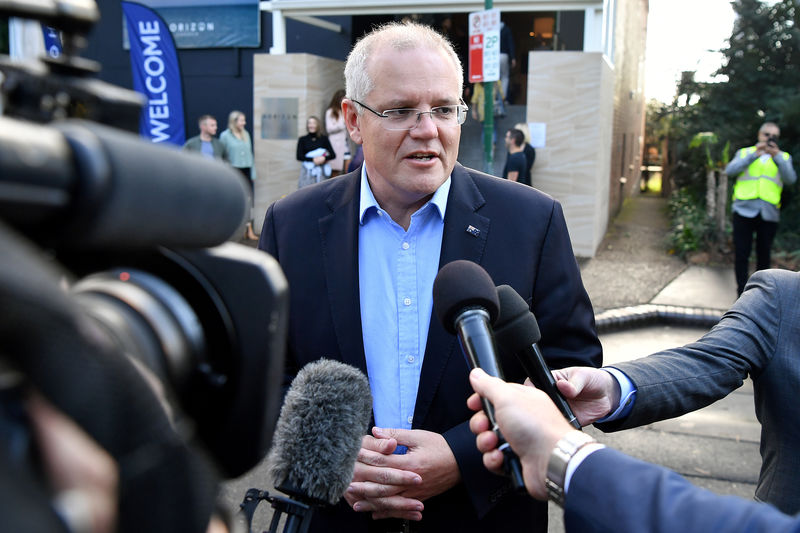By Swati Pandey
SYDNEY (Reuters) - Surprisingly retained by Australians in a national election over the weekend, Prime Minister Scott Morrison's center-right government now needs to find a fast way out of a worrying slowdown in an economy that has been recession-free since 1991.
The Reserve Bank of Australia (RBA) is expected to cut interest rates, already at record lows, later in the year, but economists say Morrison should be administering some fiscal stimulus in the coming months, rather than remain fixated on delivering Australia's first budget surplus in a decade.
"If they really are hell bent on delivering a surplus, the Australian economy and its people will suffer," said Frank Stilwell, an emeritus professor and Keynesian economist at the University of Sydney.
"They can’t deliver tax cuts and budget surpluses in a stagnant and possibly declining economy," Stillwell said, describing the campaign pledges as false promises.
The housing market is suffering its worst downturn in a generation and wages growth is anemic, leading households to sharply cut back on spending.
During the election campaign, Morrison trumpeted the record pace of job creation, and the help that planned tax cuts would provide for millions of indebted households, all to be accomplished while his Liberal-National coalition government brought the budget back toward a surplus.
Financial markets celebrated an election result that confounded opinion polls, finding "relief from the elimination of the threat of Labor's less business-friendly policies," according to Eleanor Creagh, economist at Saxo Bank.
Australia's benchmark equity index climbed to an 11-year top and the local dollar bounced off a four-month trough of $0.6862 touched on Friday to be last up 0.6% at $0.6911.
"Whilst the markets are up today on the back of the Morrison government returning to power, our suspicion is in the second half of the year fiscal stimulus may be required," said Perpetual's head of investment strategy Matthew Sherwood.
Australia's $1.3 trillion economy is sputtering.
Growth braked to an annualized 0.8 percent in the December quarter, unemployment is ticking up and inflation is still elusive, giving three good reasons to administer policy stimulus.
The March quarter was probably even worse. The data will be released next month. But forecasts show economic growth is likely to have been the weakest since the 2008 global financial crisis.
PROSPECTS FOR RATE CUTS
As clouds gather, the government has already responded by reducing some pressure on the cost of living by raising subsidies for childcare, encouraging power companies to cut electricity bills and announcing lower income taxes.
But more will be needed, analysts said, even as the center-right coalition is inclined to slash government debt and deliver a budget surplus next year.
"Greater confidence and intentions are required to turn the cycle and encourage demand to pull activity forward. If these spirits stay hibernated downside risk will remain elevated," Morgan Stanley (NYSE:MS) strategist Chris Nicol said.
Otherwise, he said, slowing growth and a lag-effect from tax cuts could open the door for further economic disappointment and hurt corporate earnings.
Perpetual's Sherwood, and a majority of more than 40 economists polled by Reuters in late-April expect at least two central bank interest rate cuts this year.
Investors now await a crucial speech by RBA Governor Philip Lowe on Tuesday for stronger clues to the timing of any rate reductions.
Earlier this month, the central bank said an easing might be needed if the labor market did not stay strong. Since then, data have showed the unemployment rate rising to 5.2% in April from a decade low of 4.9% even as hiring beat forecasts.
Then, there is also the risk from slowing global growth as a tariff-war between the United States and China turn bitter by the day.
Australia's export-heavy economy is largely reliant on global trade so a tariff war is bad news for the nation.
"I think the bigger issue that Australia faces is a home-grown one, led by the housing market. We can augment that with trade war risks," Sherwood said.
